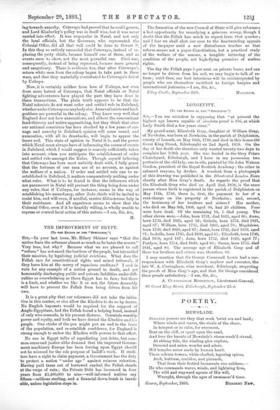THE IMPROVEMENT OF EGYPT. [To THE EDITOR Or THE "
SPECTATOR."] Siu,-In your last issue, Mr. Hilary Skinner says "that the native fears the reformer almost as much as he hates the usurer." Very true, but why? Because what we are pleased to call "reform" has not eased the burdens of the people, but intensified their miseries, by legalising judicial evictions. What does the Fellah care for constitutional rights and mixed tribunals, if they leave him at the mercy of rapacious creditors ? I seek in -vain for any example of a nation ground to death, and yet honourably discharging public and private liabilities under diffi- culties as overwhelming as those Egypt has to face; but there is a limit, and whether we like it or not, the future Assembly will have to prevent the Fellah from being driven from his own.
It is a great pity that our reformers did not take the initia- tive in this matter, or else allow the Khedive to do so by decree. No English bayonets would be required for the support of Anglo-Egyptians, had the Fellah found a helping hand, instead of only wise counsels, in his present distress. Orientals worship power and equity, and both we have denied the Khedive and his people. One stroke of the pen might put an end to the fears of the population, and re-establish confidence, for England is strong enough to endow the Khedive with powers to that effect.
No one in Egypt talks of repudiating just debts, but com- mon-sense and justice alike demand that the improved Govern- ment machinery Europe has been forcing upon Egypt should not be misused for the sole purpose of bailiff's work. If credi- tors have a right to claim payment, a Government has the duty to protect a nation "under age" against ruinous extortion. Having paid taxes out of borrowed capital, the Fellah stands at the verge of ruin ; the Private Debt has increased in four years from 21,400,000 to nine-well-informed natives say fifteen-millions sterling, and a financial down-break is inevit- able, unless legislation steps in. The formation of the new Council of State will give reformers a last opportunity for remedying a grievous wrong, though I doubt that the Fellah has much to expect from that quarter ; and I fear we shall shut our eyes to the heartrending appeals of the taxpayer until a new disturbance teaches us that reform means not a paper Constitution, bat a practical study of the welfare of the masses, a tangible bettering of the condition of the people, not high-flying promises of useless rights.
The day the Fellah pays 5 per cent. on private loans, and can no longer be driven from his soil, we may begin to talk of re- form ; until then, our best intentions will be misinterpreted by people who see themselves sacrificed to foreign harpies and international jealousies.-I am, Sir, &c.,


































 Previous page
Previous page